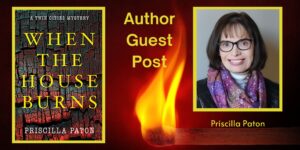Part I
You are both a writer and an editor, how do each of those skills augment or interact with the other? Can you wear both hats at the same time?
I really try not to, usually I write as fast as I can. Most days when I sit down to write, I can get two thousand words written in an hour or so. Much of this I won’t end up using in the end, but at least I get my thoughts down when they are the most full of life. The farther I go in the process, the slower and more thoughtful I become, and that is when the editor in me can come back and be more thoughtful. The more editing I do for other people, the more I have had to be careful to honor the early stages of my own process to avoid killing the energy that I need in my work. If I were thinking about theme, structure or making dialogue for each character consistent early on I am sure I would stall out pretty quickly. In the beginning it is all about finishing so I can turn around and rewrite, or more often I will need to give the work time to settle before I look at it again.
I started a project several months ago and somewhere in the middle, I found myself wondering how it would look in the end, if I would keep the snippet structure I had been drafting in, and I began worrying about the research I would have to do. I could actually feel the energy draining away until I lost interest in the thing altogether. At the early stage of a project there is an emotion or an idea I am trying to capture. The more formal elements absolutely must come later or I will sacrifice the key piece of what made the whole thing worth doing in the first place.
This is not to say that my goofy brain doesn’t still try to edit on occasion, and I am looking forward to finding out how the editing experience I have had with Sex and Death in the American Novel will serve me when I get back to Lost Dolls, the novel I was working on before this one took over my life. Since I was already three drafts in to that one, I know it is ready to be looked at more critically.
How did you arrive at writing erotica?
The books I grew up on like Anne Rice’s Exit to Eden and Beauty trilogy, plus The Story of O and especially the work of the Marquis De Sade, not to mention all the erotic horror I read showed me that within sex writing in general there was a freedom that I didn’t find in most of the other books I read. There is a unique sensibility…maybe because people were free to talk about sex they were free to imagine other things? I don’t know, but I have always read erotica and thought of those books as a place of imagination and abandon. This was a place I tried to bring my readers to while also including the other elements of the story I wanted to tell.
I don’t know that what I am writing really is erotica. Seems this will be one for others to judge. If I had my way I would be under general fiction or literary fiction since I am using the sex as a metaphor: a metaphor for reading, a metaphor for writing, a metaphor for connection.
But, as you know, where you go on the shelf at the bookstore, or where you are categorized on Amazon is important, so that is where I will be, for now.
My publisher worried that if they put me under the literary category then those readers would be upset with how much sex was in the book. I worry that readers who are looking for an experience that includes one sex scene after another will get bored with the book discussions and family scenes that comprise a good chunk of the book. Time will tell.
There are very well thought of books that contain a lot of sex: Henry Miller’s Tropic of Cancer and Erica Jong’s Fear of Flying are just a couple. E.L. Doctorow’s Book of Daniel had a couple of scenes that were very well done and included the psychology that I have come to appreciate since I rarely find it. Another one of my goals, however, was to see if I could really get into a sex scene, make it long and well described and as detailed as anything else, to give the sexual experience the respect it deserves by spending real time there. It was important to me to see if I could really bring the reader into a sex scene, make it last and have it work on different levels at the same time.
‘Literary erotica’ as a label works as well as any other because it signals to the reader that they will get detailed descriptions of sex, but there are also other elements of craft to watch for. I have read a few definitions of erotica that fit my work for this reason, but I have also had a few people say they thought of erotica as another word for porn. Labels are something that interest me in general, and especially around labels for sex writing, it seems every reader has a different interpretation of what constitutes literature or smut or porn or erotica or even mainstream fiction.
Marco Vassi, one of my favorite writers, is the only one I can think of who really went into everything that happens during sex on all levels: physical, emotional, mental, spiritual. When I first found him I felt such a deep appreciation for that. By spending time and skill on his sex scenes, by using thoughtful vocabulary, by treating it as he would any other scene, he honored it and at times elevated it. Sometimes he just wrote plain old porn, but even there you can see a different level of humanity at work in the way he does it. After I read him, I noticed how many other authors—authors I admired for different reasons—skimmed over their sex scenes and I wondered why. Does this mean that these authors, or their readers, or both, don’t value that type of human connection as just as important as any other human activity, or is there some other reason I didn’t see it described in detail in books by more well respected authors? I got curious and am still trying to figure that out.
Do you write to titillate the reader?
I did not put the sex in to arouse the reader, though if there is a side effect, I have no problem with that. I actually think that means I have done my job right. If a writer describes smoking, or eating or any other physical activity so well that I feel a craving or hunger, I would say the writer did a good job describing a human experience. So why is that different for sex writing? I wanted to make a point by including the sex scenes the way that I did. What is being aroused as a state of being? Is this any better or worse than craving a cigarette or experiencing thirst or hunger? I don’t think so. Sex, as an experience can be so many things; traumatic, routine, transformative, intoxicating, and for me, that range is what makes writing about sex well worth the effort it takes to do it right.
Describe your perfect writing day.
4:30 am I wake fresh and ready to go. (This does happen believe it or not. Ironically when I am not drinking a lot of coffee.) I work until the kids wake up at 7:30.
I switch gears and become a mom for a few hours, then once everyone is at school I get a couple more hours to work, ignoring emails, facebook and all the other distractions. (we said ideal didn’t we?)
In the evening I switch back to mommy and wife, after dinner I read until I go to sleep.
Check back September 15th for Part II!


